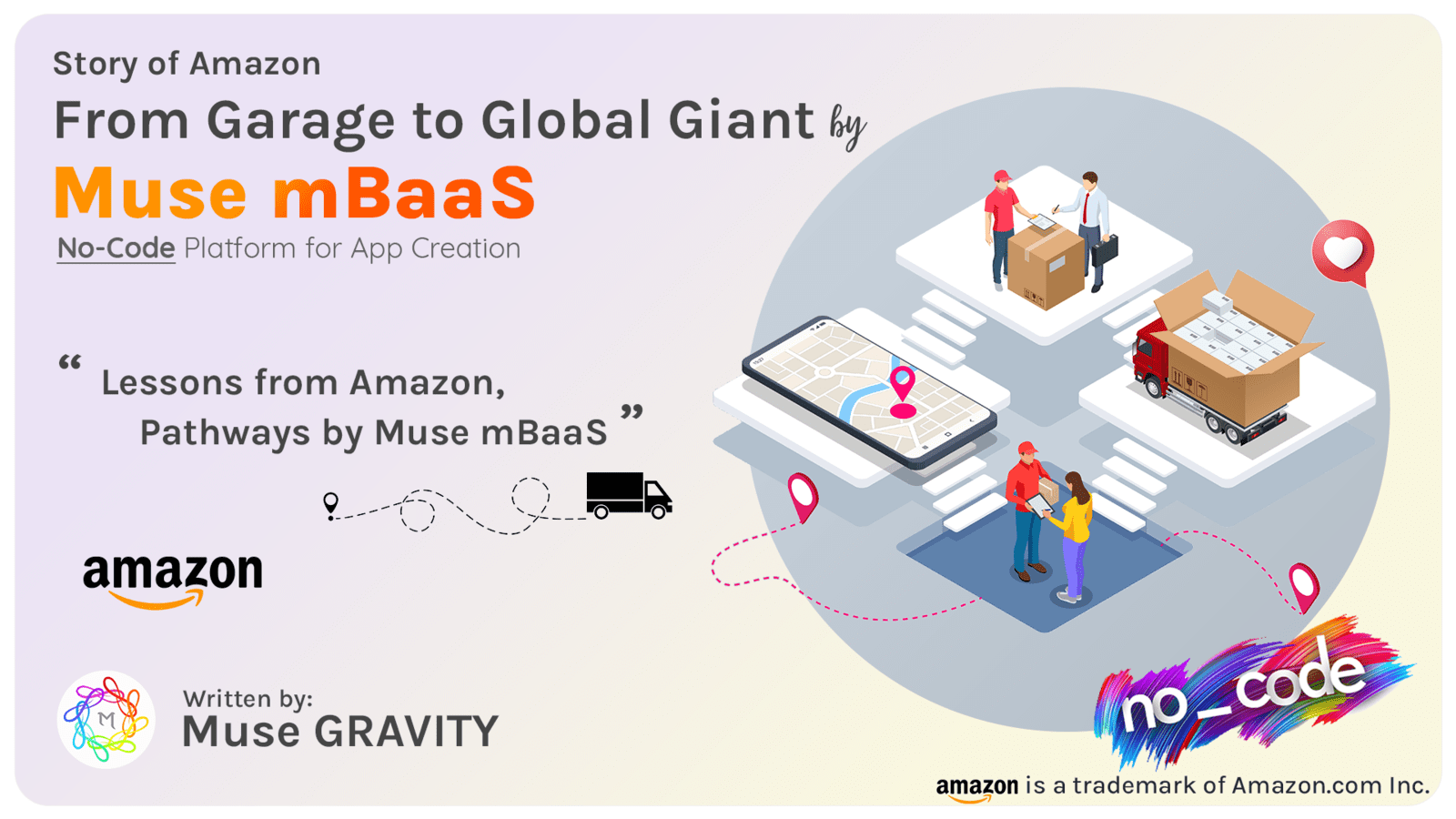
Introduction to Amazon: Redefining Commerce and Technology
History of Amazon: From a Small Bookstore to a World Leader
Amazon's story is a testament to how a small idea can evolve into a global phenomenon. It began in 1994 when Jeff Bezos launched an online bookstore from his garage in Seattle, naming it 'Amazon' after the vast South American river, reflecting his vision for the company's size and diversity.
Early Days and Rapid Expansion:
Initially, Amazon's unique selling proposition was its ability to offer an enormous selection of books, far exceeding the capacity of traditional brick-and-mortar stores. This model quickly resonated with consumers, and within a month, Amazon had shipped books to all 50 US states and over 45 countries. The company's success was bolstered by its user-friendly interface, customer reviews, and personalized recommendations - features that were revolutionary at the time.
Going Public and Diversifying:
Amazon's 1997 IPO provided the capital for expansion beyond books. Bezos's vision of an "everything store" led to diversifying product lines, including music, videos, clothes, electronics, and more, marking Amazon's transformation into a comprehensive eCommerce platform.
The Birth of Amazon Web Services (AWS):
In the early 2000s, Amazon ventured into cloud computing with AWS, initially created for its infrastructure needs. Later offered as a service to other businesses, AWS became a cornerstone in cloud computing, diversifying Amazon's revenue and establishing its technological leadership.
Growing Bigger and Faster:
Amazon's growth trajectory included global expansion and enhanced delivery services. The 2005 launch of Amazon Prime, offering expedited shipping and later streaming services, revolutionized consumer expectations in shopping and entertainment.
Acquisitions and Innovations:
Amazon's journey also features strategic acquisitions and innovations. The acquisition of Whole Foods in 2017 expanded its grocery industry presence. The Kindle revolutionized reading, while Alexa and Echo brought AI into homes.
Facing Challenges and Controversies:
Despite impressive growth, Amazon has faced labor practice criticisms, tax strategy controversies, and debates over its impact on small businesses. These issues have spurred Amazon to evolve its policies and practices.
Today, Amazon is more than a mere online retailer. It exemplifies how innovation, customer focus, and ambitious vision can reshape living, shopping, and technology usage. Amazon's evolution from a garage startup to a global leader is a compelling narrative of technological and entrepreneurial prowess.
Innovations and Technology: How Amazon Leads the Way
Amazon's story isn't just about selling things online; it's also about how they use new technology to change the way we live. Here's how Amazon has been a leader in innovations and technology:
Amazon Web Services (AWS): The Cloud Computing Revolution:
Amazon's story isn't just about selling things online; it's also about how they use new technology to change the way we live. Here's how Amazon has been a leader in innovations and technology:
Artificial Intelligence and Alexa: Smart Tech in Our Homes:
Amazon has also been a pioneer in Artificial Intelligence (AI). The best example is Alexa, Amazon's voice-controlled assistant. Alexa lives in Echo devices and can play music, answer questions, control smart home gadgets, and more, just by talking to her. This technology has made AI a regular part of many people's homes.
Kindle: Changing the Way We Read:
Amazon changed reading with the Kindle, an e-reader that lets you carry thousands of books in one slim device. The Kindle made it easy to buy and read books digitally, and it's been a big hit with book lovers around the world.
Drone Delivery: The Future of Shipping:
Amazon has been working on drone delivery with a project called Amazon Prime Air. The idea is to use drones to deliver packages quickly and efficiently, changing the way we think about shipping and delivery.
Robotics in Warehouses:
Amazon uses robots in its warehouses to move products and help with packing and shipping. This technology makes things faster and more efficient, and it's an example of how Amazon uses tech to improve how it works.
Amazon Go: The Shopping Experience of the Future:
With Amazon Go stores, Amazon introduced a new way of shopping. You just walk into the store, take what you want, and leave. Using cameras and sensors, the store automatically charges you for what you take. It's a checkout-free experience, making shopping quicker and easier.
Streaming Services: Prime Video and Music:
Amazon also changed entertainment with Prime Video and Amazon Music. Prime Video offers movies and TV shows, including original content, while Amazon Music lets you stream millions of songs. These services have made Amazon a big player in the streaming world.
Amazon's innovations and technology have significantly impacted many areas, from cloud computing and AI to e-readers and online shopping. They keep pushing the limits of what's possible, always looking for new ways to use technology to make life easier and more fun for their customers.
Controversies and Challenges: The Tough Side of Amazon's Success
Amazon's story isn't just about selling things online; it's also about how they use new technology to change the way we live. Here's how Amazon has been a leader in innovations and technology:
Issues with Workers:
People have often complained about the harsh conditions in Amazon's warehouses. Workers have spoken about very strict rules, much pressure to work fast, and not enough breaks. These issues have led to protests and efforts to start worker unions.
Being Too Big in the Market:
Amazon is so big that it controls a lot of the market, which worries some people. They think Amazon might not play fair with other businesses because it both sells products and runs the marketplace. This has led US and European governments to look closely at Amazon's business practices.
Paying Taxes:
Amazon has been criticized for not paying a lot of taxes compared to how much money it makes. This has sparked a more extensive conversation about how big companies handle taxes and their responsibility to society.
Environmental Concerns:
The way Amazon operates, especially its delivery network, affects the environment. People are worried about things like waste from packaging and pollution from delivery vehicles. Amazon has plans to reduce its environmental impact, but some say it should be doing more, faster.
Selling Real and Safe Products:
With so many products on Amazon, there's a problem with fake items and ensuring everything sold is safe. Amazon's big task is to check every product to ensure they're genuine and meet safety standards.
These issues are a big part of Amazon's story. They show the challenges that come with being a giant company in today's world. How Amazon deals with these problems is essential and can set an example for other big companies.
The Future of Amazon: Visioning Ahead
As we look towards what might come next, it's exciting to think about where Amazon could go. Remember, these ideas are predictions based on where Amazon is now and where technology might take us.
Continued Expansion in Global Markets:
Amazon might keep growing, reaching new countries and adapting to different cultures. This means understanding what people in these places need and want, and setting up the right kind of deliver
Advancements in Artificial Intelligence and Machine Learning:
Expect Amazon to dive deeper into AI and machine learning. This could mean smarter and more helpful versions of Alexa, and using AI to make shopping even more personalized and efficient.
Innovations in Logistics and Delivery:
Amazon could make delivery even faster, trying to deliver things almost as soon as you order them. Their drone delivery project, Amazon Prime Air, might become a big thing, changing how we get our packages.
Expansion of Amazon Web Services (AWS):
AWS is a big success for Amazon, and it's likely to get even bigger. It might start offering new and advanced services like edge computing or even exploring quantum computing, which could be a game-changer.
Growth in Media and Entertainment:
Amazon's Prime Video and Amazon Music might get bigger, with more shows, movies, and songs. We could also see Amazon try new things in entertainment, making their own movies or buying other entertainment companies.
Moving Beyond Retail:
Amazon could start doing things in other areas like healthcare or education, using their tech and data know-how to make new kinds of services.
Sustainability Initiatives:
As people become more aware of environmental issues, Amazon might put more effort into being green. This could mean less pollution from deliveries, more use of renewable energy, and better packaging.
Navigating Regulatory and Ethical Challenges:
Amazon will probably face more rules and questions about its power and how it handles things like worker rights and data privacy. How they deal with these issues will be necessary for their future.
These are just some thoughts on what the future could hold for Amazon. The company's path is tied to innovation and adapting to changes, whether that's through new technologies, expanding into new markets, or trying out completely new business ideas.
Conclusion:
As we reach the end of our exploration into Amazon's extraordinary journey, we are reminded of the limitless potential of vision, innovation, and customer-centricity. Amazon started in a garage with a dream and grew into a global leader, continuously pushing the boundaries of what is possible. This story serves as a powerful motivation for entrepreneurs, startups, and businesses everywhere. It's a testament to the idea that even the loftiest goals are achievable with the right approach, determination, and adaptability.
But what does this mean for you, the aspiring entrepreneur, the innovative business owner, the dreamer looking to make your mark? This is where the power of a platform like Muse mBaaS comes into play. Muse mBaaS (Mobile Backend as a Service) offers you a unique opportunity to embark on your entrepreneurial journey, just like Amazon did, but with modern technological advantages at your fingertips.
Imagine being able to design, develop, and host your custom-built Progressive Web App (PWA), Native Android App, or Native iOS App without needing extensive coding skills. Muse mBaaS makes this possible. It's a no-code, subscription-based cloud platform developed by Muse GRAVITY, providing the tools to bring your business or eCommerce ideas to life effortlessly.
By choosing Muse mBaaS, you're not just selecting a service but embracing a pathway to innovation and success. Whether you opt for the Business mBaaS or eCommerce mBaaS, you're equipped with a range of plans tailored to your needs and budget. This platform democratizes app development, making it accessible and feasible for anyone passionate about their idea.
With Muse mBaaS, the process is straightforward. Design your application according to your needs and wants with the help of integrated AI. You upload your product or data into the Muse backend, and the Muse GRAVITY Support Team then assists with the app submission, ensuring a smooth transition from concept to reality.
In a world where technology and eCommerce are increasingly intertwined, platforms like Muse mBaaS are the stepping stones for tomorrow's success stories. Your journey could be the next inspirational tale akin to Amazon's, reshaping industries and setting new benchmarks. It all starts with a vision and the courage to take that first step.
So, as we look back at Amazon's inspiring saga, let us also look forward to the potential stories yet to be written, including yours. With resources like Muse mBaaS at your disposal, the path to innovation and success is not just a dream but a tangible reality. Take that step, embrace the journey, and let your vision guide you to new heights. The future awaits, and it's yours to shape.
No Credit Card Required
Your Questions, answered
















